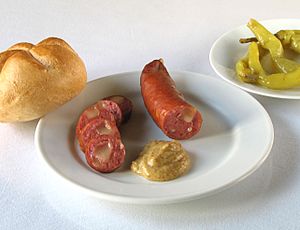Käsekrainer facts for kids
Käsekrainer is a special type of sausage from Austria. It's a lightly smoked sausage that contains small pieces of pork and about 10% to 20% cheese. The cheese is usually Emmentaler, cut into tiny cubes. You can find Käsekrainer sold all over Austria, especially at places called Würstelstand (sausage stands). It is a type of Carniolan sausage. Two people from Upper Austria, chef Herbert Schuch and Franz Thalhammer, invented Käsekrainer in the late 1960s.
How to Cook and Eat Käsekrainer
Käsekrainer sausages can be cooked in different ways. You can boil them, roast them, or grill them.
The traditional way to eat Käsekrainer is with mustard and freshly grated horseradish. Sometimes, people also add ketchup and sprinkle a little curry powder on top.
A popular way to enjoy Käsekrainer is as a hot dog. The sausage is placed inside a hollow piece of white bread with mustard or ketchup. In the Linz area, a Käsekrainer sandwich, similar to a Bosna sandwich, is sometimes called a "Kafka."
It's important not to confuse Käsekrainer with the Berner sausage. A Berner sausage is a Vienna sausage (called Frankfurter in Austria) that is cut open, filled with Emmentaler cheese, and then wrapped in roasted bacon.
Fun Fact About Käsekrainer in Vienna
In Vienna, Käsekrainer is a very popular food. There's a funny story, an urban legend, about how people order it at a Würstelstand. The story says that people often say: "a Eitrige mit an Schoafn, an Bugel und an 16er-Blech." This phrase in the Viennese dialect means: "a Käsekrainer with strong mustard, a piece of bread, and a glass of Ottakringer beer."
However, this phrase is actually not very common in Vienna. It became popular because tourist guides and TV shows often said it was the typical Viennese way to order. So, if you use this phrase, locals might quickly know you're a tourist! More recently, people sometimes add "owa Tschenifer" to the order, which means "and quickly." This comes from the singer Jennifer Rush, because her last name "Rush" sounds like the German word rasch, which means "quickly."
See also
 In Spanish: Käsekrainer para niños
In Spanish: Käsekrainer para niños
 | Chris Smalls |
 | Fred Hampton |
 | Ralph Abernathy |


